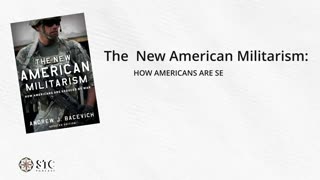Premium Only Content

Episode 1686: City of God - St Augustine - Book 10 - Destiny of earthly city and the city of God
Book 10: Augustine explores the relationship between the earthly city and the city of God, examining the destiny of each.
In Book 10 of "City of God" by St. Augustine, the focus shifts to the interpretation of certain events in Roman history, particularly the sack of Rome by the Visigoths in 410 AD. Augustine explores the theological implications of these events and delves into the concepts of divine justice, the nature of earthly cities, and the contrasting destinies of the City of God and the Earthly City. Here's an overview of the key themes in Book 10:
Sack of Rome and Divine Justice:
Augustine addresses the shock and dismay that many felt at the sack of Rome, a city traditionally considered invincible. He argues that the event should be understood within the framework of divine justice, as a consequence of the sins of the Roman people.
Theological Reflections on History:
Augustine engages in a deep theological reflection on the nature of history. He contends that events, whether seemingly positive or negative, are all part of God's providential plan, and their significance should be understood in the context of divine governance.
Earthly Cities and Their Destiny:
Augustine further develops his contrast between the destinies of the City of God and the Earthly City. He argues that earthly cities, including Rome, are subject to change, decay, and destruction, and their true significance lies in their alignment (or lack thereof) with the City of God.
Christian View of True Citizenship:
Augustine discusses the concept of true citizenship for Christians. He contends that while earthly cities have their place, the ultimate allegiance of Christians is to the City of God. True citizenship is found in living a life that conforms to the values of God's eternal city.
The Role of True Religion:
Augustine explores the idea that true religion, centered on the worship of the one true God, is the foundation of the City of God. He contrasts this with false religions and idolatry, asserting that the latter leads to the degeneration of human societies.
The End of the World and the Last Judgment:
Augustine introduces eschatological themes, discussing the end of the world and the Last Judgment. He emphasizes that the destinies of the City of God and the Earthly City will be fully revealed in the final judgment, with the righteous finding eternal happiness and the wicked facing divine judgment.
Christian Hope and Consolation:
Augustine offers Christian readers hope and consolation in the face of earthly trials. He encourages them to endure with faith, recognizing that the City of God is their true home and that God's providential plan extends beyond the challenges of the present.
God's Guidance in Human Affairs:
Augustine reaffirms the belief in God's active guidance in human affairs. He argues that God's providence is at work even in the midst of historical upheavals, and the faithful should trust in His wisdom and purpose.
Critique of Pagan Philosophies:
Augustine engages in a critique of certain pagan philosophies that attempt to explain or interpret the events of the world without reference to divine providence. He contrasts these with the Christian worldview centered on God's governance.
The Eternal City's Victory:
Augustine concludes Book 10 with the affirmation that the City of God will ultimately emerge victorious over all earthly challenges. The eternal and unshakable nature of the City of God contrasts with the transient and mutable nature of earthly cities.
In Book 10, Augustine continues to weave together theological reflections, historical events, and his vision of the contrasting destinies of the City of God and the Earthly City. The sack of Rome becomes a poignant backdrop for his profound exploration of divine justice, human history, and the ultimate meaning of earthly and heavenly citizenship.
-
 1:23:33
1:23:33
Michael Franzese
14 hours agoThings to look forward to in 2025
76.2K41 -
 3:23:02
3:23:02
I_Came_With_Fire_Podcast
15 hours agoDefeating VICTIMHOOD: Advocacy, Resiliency, and Overcoming Abuse
87.7K15 -
 2:00:56
2:00:56
Game On!
22 hours ago $10.02 earnedNFL Experts debate if Joe Burrow will make HISTORY in Week 18!
107K12 -
 2:07:57
2:07:57
InfiniteWaters(DivingDeep)
4 days agoHOW TO ENTER 2025 LIKE A BOSS!
38.4K1 -
 15:43
15:43
Tactical Advisor
8 hours agoBEST and WORST Guns Of 2024
28.9K7 -
 9:14
9:14
Dermatologist Dr. Dustin Portela
8 hours ago $0.98 earnedProducts a Dermatologist Actually Uses
26.3K10 -
 20:54
20:54
inspirePlay
9 hours ago $3.94 earned🏌️♀️ Extreme Knockout Golf Challenge Part 2 – Do the GIRLS beat the BOYS? 🏌️
48.4K2 -
 24:09
24:09
Squaring The Circle, A Randall Carlson Podcast
9 hours ago#033 At The Crossroads - Squaring the Circle: A Randall Carlson Podcast
32.3K12 -
 50:17
50:17
BIG NEM
5 days agoBrian Herzog: From Zero to 150 MILLION Views in a Year 🚀
21.5K2 -
 2:48:35
2:48:35
FreshandFit
22 hours agoHenny Chris VIOLATES 5 Girls 🤣
209K225